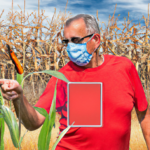The text analyses the impact of organic farming and the use of biofertilizers on non-target insects. Synthetic pesticides can harm these insects and upset the ecological balance. Biofertilizers, agricultural products based on microorganisms, are safer alternatives that promote a healthy agricultural environment and preserve biodiversity. The adoption of these methods represents an effective strategy for more sustainable agriculture.
Modern agriculture faces a growing challenge: how to maintain crop productivity and quality while minimizing environmental impact. One of the most debated topics in this context is the use of pesticides and fertilizers in agriculture, and their effect on non-target insects. This issue is especially relevant in organic farming, where biodiversity and ecosystem health are sought to be preserved. This article will address the impact of pesticides on non-target insects, the side effect of fertilizers, and how biofertilizers and other agricultural products can serve as safer and more sustainable alternatives. The effects of pesticides on non-target insects will also be assessed, providing a comprehensive analysis of this complex problem and its potential solutions.
- 1. "Impact of pesticides in organic farming: Non-target insects"
- 2. "Fertilizers and their side effects: how pesticides affect non-target insects"
- 3. "The use of biofertilizers as an alternative to pesticides to protect non-target insects"
- 4. "Agricultural Products: Evaluating the Effects of Pesticides on Non-Target Insects"
1. "Impact of pesticides in organic farming: Non-target insects"
Organic farming, which is characterized by the use of natural fertilizers and biofertilizers instead of synthetic pesticides, aims to minimize damage to the environment and preserve biodiversity. However, even in this farming system, agricultural products can be used that have a significant impact on non-target insects. These insects, which may be beneficial pollinators or natural predators of pests, may be directly affected by pesticides, for example through direct contact with or ingestion of pesticide residues. They may also be affected indirectly, through changes in their habitat or food availability. Therefore, the impact of pesticides on non-target insects is an important issue that needs to be considered in the context of organic farming.
2. "Fertilizers and their side effects: how pesticides affect non-target insects"
Fertilizers, widely used in conventional agriculture, have significant side effects on the environment and in particular on non-target insects. Pesticides, often applied together with fertilizers, can have devastating effects on these insect species, which play a vital role in the ecosystem, for example in pollination and pest control. Often, these chemicals do not distinguish between harmful and beneficial insects, indiscriminately exterminating and upsetting the ecological balance. Faced with this problem, organic farming proposes more sustainable and less harmful alternatives. Biofertilizers and other naturally derived agricultural products not only nourish the soil, but are also safe for non-target insects, thus protecting biodiversity and promoting a healthier and more balanced agricultural environment.
3. "The use of biofertilizers as an alternative to pesticides to protect non-target insects"
In the field of organic farming, the use of biofertilizers is emerging as a sustainable and environmentally friendly alternative to the use of pesticides. Biofertilizers are agricultural products based on microorganisms that promote the availability and assimilation of nutrients by plants. They not only enhance plant growth, but can also help protect plants from various pests and diseases without causing harm to non-target insects. Unlike chemical pesticides, biofertilizers are not toxic to these insects, which protects their biodiversity and contributes to maintaining the balance of the ecosystem. Therefore, the adoption of biofertilizers instead of pesticides can be an effective strategy for more sustainable agriculture that is respectful of the life of non-target insects.
4. "Agricultural Products: Evaluating the Effects of Pesticides on Non-Target Insects"
In the context of agricultural products, assessing the effects of pesticides on non-target insects is essential to maintaining a balance in the ecosystem. Often, these pesticides, used with the intention of protecting crops, can have devastating effects on beneficial insects, altering biodiversity and affecting soil health. Therefore, organic farming promotes the use of safer and more sustainable alternatives, such as biofertilizers, which not only enrich the soil but also reduce the dependence on harmful chemicals. As awareness of the collateral damage caused by pesticides grows, farmers are exploring more sustainable and environmentally friendly methods, including the use of organic fertilizers and the implementation of agricultural practices that favor the preservation of the life of non-target insects.
The indiscriminate use of pesticides in agriculture can have devastating consequences on non-target insects, significantly affecting biodiversity and the health of ecosystems. Organic farming, which promotes the use of more environmentally friendly agricultural techniques and products, is presented as a viable alternative to minimize these impacts. Among these, biofertilizers stand out as an option that, in addition to being less harmful to non-target insects, also contributes to improving soil health and crop productivity. However, more research is needed to thoroughly evaluate the effects of pesticides and find strategies that allow for sustainable agriculture that respects life in all its forms.


